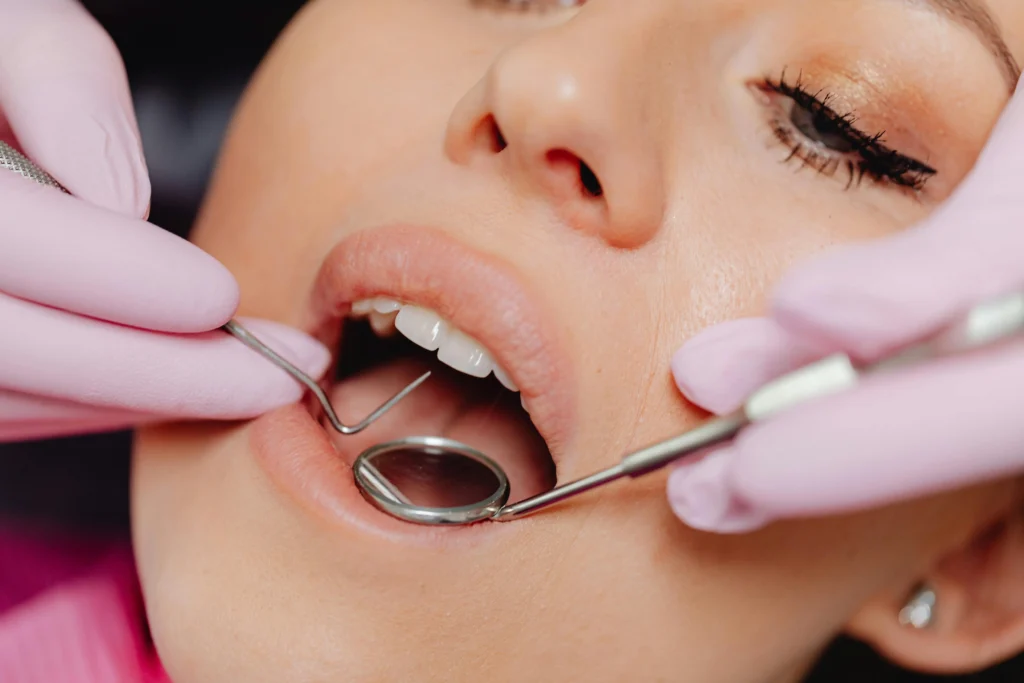Blog
Family & Cosmetic Dentistry | Located in Savannah
October 29, 2024
Understanding the Connection Between Oral Health and Overall Wellness
Oral health is more important than many realize. In fact, studies show that poor oral hygiene can lead to severe health issues. For example, gum disease has been linked to an increased risk of heart disease and other systemic conditions. This article explores the connection between oral health and overall wellness, focusing on the links between oral hygiene and serious health problems like heart disease, diabetes, and respiratory illnesses.
We will examine how poor oral health can contribute to these conditions and offer insights on maintaining a healthy mouth for a healthier body.
The Link Between Oral Health and Overall Wellness
Oral health is not just about having a bright smile—it can serve as a window into the body’s overall condition. The mouth often shows early signs of systemic diseases. For example, conditions like diabetes or vitamin deficiencies may first present symptoms through issues like gum disease or oral infections. In this way, oral health is closely linked to general wellness.
One of the key connections is the role of oral bacteria and inflammation. The mouth naturally contains a variety of bacteria, many of which are harmless. However, poor oral hygiene can allow harmful bacteria to thrive, leading to infections like gum disease (periodontitis). When left untreated, these bacteria can enter the bloodstream, triggering inflammation throughout the body. This systemic inflammation has been associated with several serious health conditions.
For instance, oral bacteria have been linked to the formation of arterial plaque, contributing to cardiovascular diseases like heart attacks and strokes. Similarly, inflammation caused by oral infections may worsen existing conditions like diabetes by affecting blood sugar levels. Respiratory issues can also arise, as bacteria from the mouth can travel to the lungs, potentially causing infections like pneumonia. Thus, maintaining good oral health plays a crucial role in preventing widespread health complications and promoting overall wellness.

Gum Disease and Cardiovascular Health
Overview of Gum Disease
Gum disease, also known as periodontal disease, is an infection of the tissues that hold your teeth in place. It starts with gingivitis, a mild inflammation of the gums, and can progress to periodontitis, a more severe form where the gums pull away from the teeth, forming pockets that become infected. If left untreated, this can lead to tooth loss.
Research on the Connection
Studies suggest a strong link between gum disease and cardiovascular health. Bacteria from inflamed gums can enter the bloodstream, causing inflammation in blood vessels. This can lead to the formation of plaque in arteries, which restricts blood flow and may result in heart conditions. A report from the American Heart Association highlights that people with periodontitis are more likely to develop atherosclerosis (hardening of the arteries), which can trigger heart attacks or strokes.
Risks of Heart Disease
Untreated gum disease poses a significant risk to heart health. As the bacteria spread through the bloodstream, they can aggravate existing cardiovascular issues and increase the likelihood of severe outcomes such as heart attacks and strokes. The systemic inflammation caused by chronic gum disease can also exacerbate other underlying health conditions, further straining the heart. Regular oral care and professional dental treatments are essential to prevent both gum disease and associated cardiovascular risks.
Read also: Essential Tips for Healthy Gums: A Guide to Preventing Gum Disease
Oral Health and Diabetes
Bidirectional Relationship
The relationship between oral health and diabetes is two-way. On one hand, individuals with diabetes are at a higher risk for gum disease (periodontitis) due to weakened immunity, which slows healing and allows infections to persist. On the other hand, gum disease can make it harder to control blood sugar levels, creating a dangerous cycle. Studies show that untreated gum disease can even worsen diabetes.
Impact of High Blood Sugar on Oral Health
For diabetics, elevated blood sugar levels fuel the growth of harmful bacteria in the mouth, increasing the risk of infections like gum disease. The sugar in the blood also makes the gums more vulnerable to inflammation, exacerbating oral health problems. This makes diabetic individuals more prone to experiencing severe gum disease, which can lead to tooth loss and other complications.
Managing Diabetes Through Oral Care
Maintaining proper oral hygiene can play a key role in managing diabetes and preventing further complications. Here are a few essential tips:
- Brush and floss daily: Keeping the mouth clean helps remove bacteria and prevent infections.
- Regular dental checkups: Diabetics should visit their dentist at least twice a year to monitor for gum disease and other issues.
- Monitor blood sugar levels: Proper diabetes management reduces the risk of oral health issues. By practicing good oral hygiene, diabetics can better control their blood sugar levels and reduce the severity of diabetes-related complications.

The Role of Oral Health in Respiratory Diseases
Oral Bacteria and the Lungs
Poor oral hygiene can allow bacteria in the mouth to travel to the lungs, where they can cause infections like pneumonia and worsen chronic respiratory conditions. This occurs when oral bacteria are inhaled or aspirated, particularly during sleep, leading to inflammation in the lungs.
Risks for Vulnerable Populations
Elderly individuals, those with weakened immune systems, and people with chronic respiratory diseases, such as COPD (chronic obstructive pulmonary disease), are at greater risk of developing respiratory infections linked to poor oral health.
Preventative Measures
Practicing good oral hygiene—brushing, flossing, and regular dental visits—helps reduce the amount of harmful bacteria in the mouth, thereby decreasing the risk of respiratory diseases. For vulnerable individuals, maintaining oral health is a critical part of protecting lung health and preventing severe infections.
Oral Health and Pregnancy Outcomes
Hormonal Changes and Gum Disease
During pregnancy, hormonal fluctuations increase a woman’s susceptibility to gum disease (gingivitis), which can cause swelling, bleeding, and sensitivity. This condition is common and typically worsens during the second trimester, as increased levels of progesterone and estrogen promote an exaggerated response to oral bacteria.
Impact on Pregnancy
Poor oral health during pregnancy is linked to complications such as premature birth and low birth weight. Bacteria from infected gums can enter the bloodstream, triggering an inflammatory response that may lead to early labor.
Prevention and Care
To maintain oral health during pregnancy:
- Brush and floss daily to remove plaque.
- Visit your dentist regularly for cleanings and checkups.
- Eat a balanced diet rich in vitamins and minerals to support gum health.
- Avoid smoking or sugary foods, which can exacerbate gum problems.
By taking preventive measures, pregnant women can protect both their own health and that of their baby.

Oral Health and Cognitive Decline
Link to Dementia and Alzheimer’s Disease
Recent research suggests a link between gum disease and cognitive decline in older adults, including conditions like dementia and Alzheimer’s disease. Studies show that individuals with chronic periodontitis may have a higher risk of developing cognitive issues later in life.
Inflammation and the Brain
Chronic inflammation caused by poor oral health may contribute to damage in brain tissues over time. Bacteria from the mouth can travel to the brain, triggering immune responses that may accelerate cognitive decline.
Protecting Cognitive Function
To reduce the risk of cognitive decline, maintaining proper oral hygiene is key. Regular brushing, flossing, and dental checkups can help prevent gum disease and reduce inflammation. By protecting oral health, individuals may also help safeguard their cognitive function.
Read also: What is a Dental Bridge: Comprehensive Guide
Oral Health and Digestive Health
Oral Health’s Role in Digestion
The process of digestion begins in the mouth, where food is broken down through chewing and mixed with saliva. Poor oral health, such as tooth decay or gum disease, can interfere with this process, making it harder to chew food properly, which impacts digestion further down the line.
Impacts of Missing Teeth or Oral Pain
When missing teeth or oral pain from conditions like gum disease affects chewing, it can lead to inadequate breakdown of food, which may cause digestive problems such as indigestion or nutrient malabsorption.
Tips for Supporting Digestive Health
To promote better digestive health, maintain strong oral hygiene habits by brushing, flossing, and visiting your dentist regularly. Additionally, eating a balanced diet and staying hydrated can help protect your teeth and gums, ensuring efficient digestion from the start.

Strategies for Maintaining Optimal Oral Health
Daily Oral Hygiene Routine
Maintaining optimal oral health starts with a consistent daily routine. Brush your teeth twice a day for at least two minutes, using fluoride toothpaste. Floss once daily to remove food particles and plaque between teeth, and use mouthwash to kill harmful bacteria and freshen your breath.
Dietary Considerations
Your diet plays a crucial role in oral health. Limit your intake of sugary foods and drinks, which can lead to tooth decay. Incorporate foods rich in calcium (like dairy products) and vitamins (such as leafy greens) to strengthen teeth and gums.
Regular Dental Checkups
Visiting the dentist for regular cleanings and exams—at least every six months—is essential. Dental professionals can spot early signs of issues like cavities or gum disease. This is especially important for individuals with chronic health conditions, as oral health is closely linked to overall wellness. Regular checkups can prevent minor issues from becoming major problems.
Conclusion
Oral health is closely tied to overall wellness, impacting conditions like heart disease, diabetes, and even cognitive decline. By practicing good oral hygiene, eating a healthy diet, and visiting the dentist regularly, you can reduce your risk of developing serious health issues. Prioritizing oral care not only protects your teeth and gums but also supports your body’s overall health.
Remember, maintaining oral health is an investment in your long-term well-being. By taking care of your mouth, you contribute to a healthier future for your entire body.

